#and there are a lot of bad impacts
Text
like yeah dude it’s really cool that you used AI to complete an art piece that was purposefully left unfinished because the artist was dying of AIDS as the government ignored the mass loss of life and health. all you really did was show that technology can bring an art piece into the modern age but why? why do we need to do that? what does it say about us if we feel that a piece needs to be ‘completed’? how are we viewing completion?? can seeing an ai generated “completion” of unfinished have the same effect of seeing the parts haring left blank and the parts where the art drips into the blank? does it aid the narrative of it in any way? can AI understand the levels at which artists used their pieces about AIDS as a form of protest? of begging to be seen? how can it when an AI’s concept of ‘completing’ the piece is just guesswork of what the colours and shapes would look like to match what haring made which is nowhere near the same level of intention that came from him? you said you ‘completed’ the piece with ai because his story is so sad but does that mean we should try to rectify sadness by getting rid of the representation of it? should we not continue to sit in the sadness and discomfort that unfinished and other AIDS inspired art asks us to do because those feelings are only a fraction of what the people who died and lost felt, is that not the least we can do for them? and what good does any of this actually do when we can use technology to ‘complete’ a purposefully unfinished art piece about an artist’s untimely death from AIDS but we can never bring keith haring or any other person who died of AIDS back to life? where does haring, the person whose illness and death lives in those blanks, come into your self fulfilling ai generated completion of his work?
#like I don’t feel anything when I see it because I don’t see the depth of a man processing his own untimely death#I saw someone say this proves AI can be transgressive and like ai has nothing to do with the potential of completing a piece like that#it didn’t make any choices with significance it just filled in the blanks in a very mechanical way#blanks that haring had to think about leaving blank and what that would mean#you could have achieved that with like. human artists and in that way you could have the piece be more intentionally connected#to the original and it’s artist#you know I’m actually not even an ai isn’t real art person#because I think it gets counterproductive to draw thick lines between what is and what isn’t art#and I think elements of ai could be developed in a harmless way#but ai art as it popularly exists currently IS harmful to most artists#and just people in general#it doesn’t matter whether it’s art or not what matters is the impact it’s having#and there are a lot of bad impacts#this one isn’t the worst I just think it’s an example of how stupid people are with ai art and like#how a lot of peoples defence of ai art actually misses the point of art#because they see it in a technical skill mechanical way#it says SOOOO much that people thought this piece needed to be ‘#’completed’ and that filling in the blank would aid the message#and assumed that the blank parts didn’t hold the same if not more artistic weight#sorry for posting about discourse I saw on twitter do you still think I’m hot
4 notes
·
View notes
Text
here is your reminder that all trauma is valid.
trauma is to do with how our brains process (or don't process) memories and experiences and that if something is traumatic for you then that is trauma.
it doesn't matter if you or someone else thinks it should be significant or not or if someone else went through the same thing and wasn't impacted by it. what matters is if it's significant to you and how it impacted you.
a huge part of recovering from trauma is allowing yourself to accept that you had it in the first place.
#I've been seeing a trauma informed therapist and its very enlightening#i spent so long denying that i had any form of trauma despite having all the symptoms because I've never experienced anything *that bad*#but it doesn't have to be one thing even. it can be a lot of little things that build up.#it doesn't matter if someone else went through the same thing and wasn't impacted by it. you where.#adhd#trauma#recovery#love letters to you
629 notes
·
View notes
Text
Furina: Anyone I've ever worked with probably couldn't wait to get rid of me... Since I'm just an ordinary person now. They'll probably just laugh in my face if I go asking them for help... :(
Neuvillette, the second Furina asks him about booking the Opera Epiclese, the process for which is notably cumbersome and complex: Yes, I will take care of it immediately. Btw does this mean you will allow audiences (myself included) to enjoy your outstanding acting talents once more? 🥺
#furina#neuvillette#genshin 4.2 spoilers#genshin spoilers#genshin 4.2#genshin impact#he is so horrendously pathetically down bad for her#i want to put clown make-up on him and beat him up in a parking lot#MY MAN#YOU ARE ONE STEP AWAY FROM SERENADING AT HER WINDOW#so yeah i played furina's story quest#her 1st story quest was kinda depressing#but also hopeful#we still have her presumed 2nd story quest for the 2nd weekly boss of Fontaine#maybe this one will have an all-around happier note#building on the hopeful end of her 1st one#i just want furina to be happy :')#focallette#neuvifuri
3K notes
·
View notes
Text
something something one of those those "Jango falls for Courtesan/Stripper/NightclubSinger/TrophyWife!Obi-Wan" AUs...
But instead Obi-Wan actually being a sex worker, he's undercover and still a Jedi, and either:
They split ways and run into each other a few months later with Obi-Wan in full Prude Beige Knight mode
OR
The situation goes pear-shaped while they're still flirting and Obi-Wan has to break cover to grab a senator and jump out a window and suddenly this half-dressed glittery Person is batting away shots with a lightsaber
and there's a bratty twelve-year-old who ALSO has a lightsaber threatening people with I Will Eat Your Liver if they keep staring at his dad's ass just because the sequined sheathe dress tore in a sexy place
#jangobi#jango fett#obi wan kenobi#anakin skywalker#star wars#phoenix talks#undercover au#undercover as sex worker#to be clear: I do enjoy sex worker AUs both as a form of entertainment and in their surprising weight in normalization of sex work#they've done an unprecedented amount of work humanizing the profession#for sheltered young people who might have otherwise needed a lot longer to get over their prejudices#and while in my case I started on that path of Recognizing People As People through reading firsthand accounts by sex workers online#the impact that sex worker AUs have had on that whole situation is not to be dismissed#but also they're just fun to read? they're entertaining in the way any profession-based AU can be#I'm just as eager to read a sex work AU as I am to read a senator AU or racer au or college professor au etc#...anyway I just realized that the original post could theoretically be read as 'sex worker AUs bad' and I don't want anyone to think that
907 notes
·
View notes
Text
I find it so amusing that Alhaitham's "least favourite food" voiceline is this:
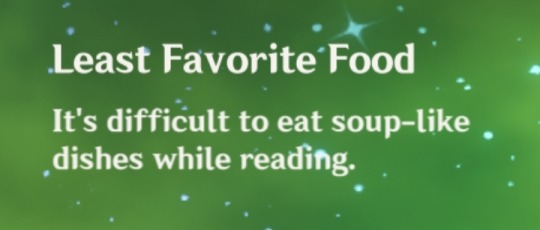
Which, like, A) doesn't actually say anything about his tastes, and B) nerd.
But then his signature dish is this:
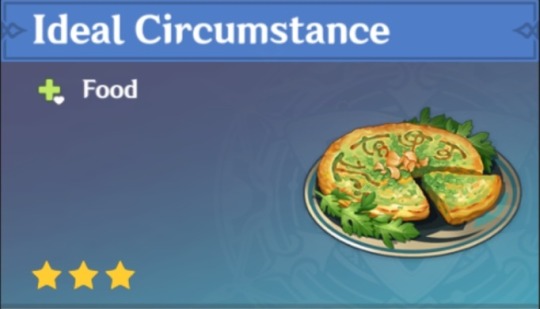
Derived from this:
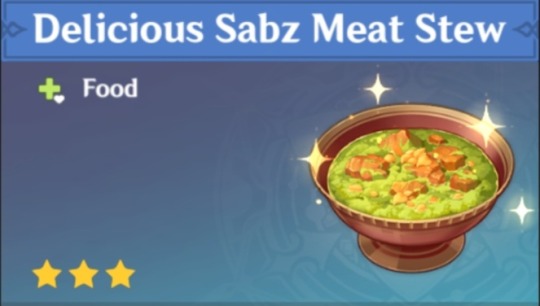
He LITERALLY just took a stew, a "soup-like" dish, fried it into a pie(?) so that he could eat it like pizza while reading.
(and for my Kavetham/Haikaveh girlies out there, the signature says "contemplation" on top. Which really feels like Alhaitham's passive aggressive way of telling Kaveh to think things through more.)
#genshin impact#alhaitham#al haitham#kaveh#kavetham#i like this detail a lot#he's such a nerd!!!#what a feckin nerd!!!#also i feel like actual foodies hate him#Xiangling would have an aneurysm watching him turn stew into finger food#torn between Alhaitham cooking for Kaveh#as the message on top implies imo#or Kaveh cooking because Alhaitham's cooking#while not bad#is an insult to god#*the gods
2K notes
·
View notes
Text

☔️ This weather is so gloomy. May I light up your day ? ☔️
#genshin impact fanart#genshin impact#genshin#genshin neuvillette#neuvillette#artistsontumblr#genshin wriothesley#wriothesley#neuvithesley#wriolette#i wanted to draw this scene so bad#babygirlifying neuvillette every time I draw him#and I’m planning to draw him a lot#this art can be interpreted however you want but a girl’s gotta eat so I’m putting ship tags#love these two more than the world tho
392 notes
·
View notes
Text
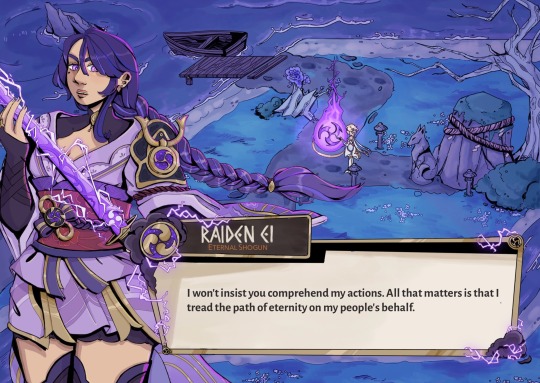
eternal shogun
#genshin impact#raiden ei#my art#WHEW#WE GOT THERE. EVENTUALLY.#14 HOURS ON THIS BAD BOY ‼️‼️#the background felt like bashing my head a brick wall but we FINISHED and i reluctantly like the final project so it was worth it!!#man. this project is a Lot of time and effort#but also a lot of fun!#three to go! focalors next :)#i'm already pretty far into her portraits colors but i haven't started on the bg at all 😶🌫️#ah well#we shall persist regardless#id in alt#click fir quality i'm sure tumblr'll slaughter it
144 notes
·
View notes
Photo

I think my style is changing slightly but not much. I am trying to figure out light.
#♡#Genshin impact#原神#Heikazu#Kazuhei#Kazuha#Kaedehara Kazuha#Heizou#Shikanoin Heizou#The lovers!#They are married in my universe btw#if y'all asking about the rings#also i am on art block#my bad#school is making me run around a lot beside me trying to get work#so#for now them
774 notes
·
View notes
Text
God gives his toughest battles (being at work DESPERATELY wanting nothing more than to be at home playing the new Genshin Fontaine update) to his bravest soldiers (me)
#Shima speaks#Genshin Impact#I PUSHED IT LAST NIGHT EVEN. I went to bed later than I should have bc I was having TOO MUCH FUN...#I have a lot of thoughts but here are some#A. STEAMPUNK STEAMPUNK STEAMPUNK STEAM PU#B. Fontaine gives me MASSIVE Unova vibes. Mountainy region with lots of pine trees.....also reminds me of home irl#C. THE UNDERWATER SECTIONS ARE SOOOOOO COOL AND SO FUN AND SO PRETTY AND SO#D. I got Lyney on literally my LAST pull call that lucky ducky#E. The update was TOO chonky....I had to delete HSR off my iPad bc Genshin's so FUCKING thicc. WHY is it so thicc#I was able to redownload HSR onto my phone bc my phone ACTUALLY has decent storage space.#I mean my iPad has 64 gigs but Genshin takes up like. 40 of that#And HSR is around 13 gigs rn#My iPad was like nope can't do it fam ;)#Me: NAURR!!!!!#Anyway I'm the bearer of the curse (being at work wanting to play in Fontaine so so so SO bad)
288 notes
·
View notes
Text
Something something you stop by Neuvillette's office to bring him something and have a quick visit and the second you leave, a sun shower starts up.
Slowly at first, as if the sky itself is hesitant to let the rain fall before it opens up completely. Rain lines the streets with gold and clings to fresh flowers sitting in open stalls. A few citizens seek shelter under awnings and cafe umbrellas; one couple braves the rain and laughs on their stroll.
This rain is warm. Welcoming. Unlike the cold, unforgiving rain that follows an evening trial.
It's an embrace; a realization and a confession rolled up in one, heavy, cloudless rain.
One that you just haven't figured out yet.
#toast talks#genshin impacted#sorry everyone I had the vision of Neuvillette falling in love/realizing hes falling in love and it just starts raining#not because he's said but because it's such an intense emotion that he's rarely ever felt that it just starts raining#it's nothing compared to when he first started recognizing this feeling as love. THAT was a downpour.#It was so bad in fact that Furina literally came to check on why he was so upset and he was like#'Lady Furina I believe I may be 'in love''#and Furina is like...'but why is it raining tho?? Are you okay???'#He's not okay. He's old he's exhausted and he's falling in love. There's a LOT on his mind right now!!!#Thinking anout that teapot line again. About how loving and being loved in return is something that he felt so strongly about.#Picking up lovesick and hopeless romantic Neuvillette in my arms and smooching him rn#okay visibilty tag time:#x reader#genshin x reader#neuvillette x reader#neuvillette x you#This is so Eclairette coded but idc y'all be indulgent with me before I explode
101 notes
·
View notes
Text

"rizz master" my ass, he's a pining loser-
#i love him ok i like him a lot#and damnnn he is so down bad laksdjlasd#literally only second to Xiao and thats XIAO for celestias sake#he would Not be so confident and flirty once the traveler actually returns his feelings#if anything the anxiety would swell up fr lakdjlaksd#evelynpr genshin#genshin#genshin impact#lyney
88 notes
·
View notes
Text
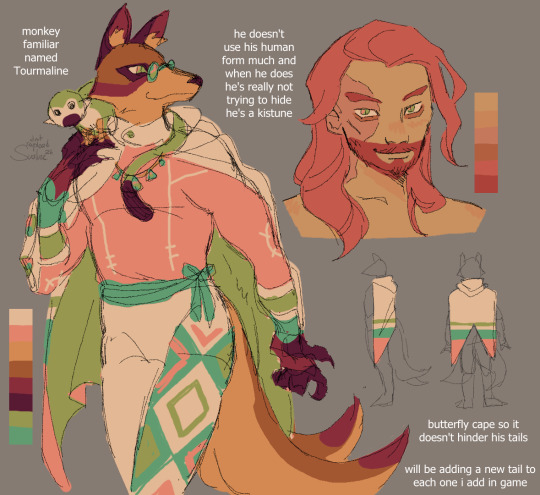
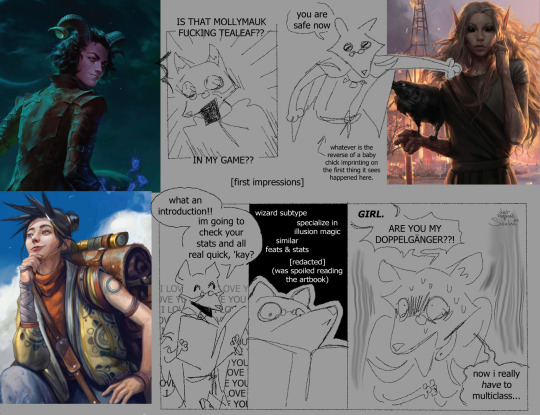
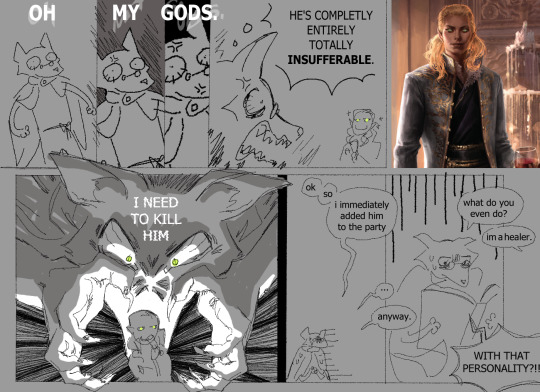
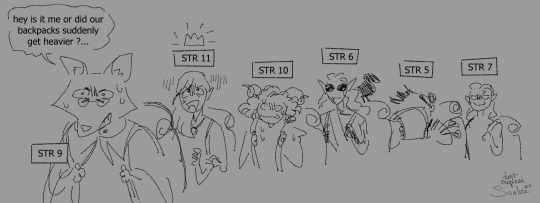
salix's current party, a very balanced crew both stats wise and mentally.
#pathfinder wrath of the righteous#my ocs#my art#my comic#wrath of the jo#described in alt text#redesigned salix cause he looked So Bad. it's mostly a changed in style but he's also the same and A Lot better. im at lvl 3. haven't playe#much. trying to take it easy and slow. i was worried with the first four companions. theyre personality at first wasnt too thrilling but#those other four had much more impactful introduction so im not worried anymore. my group of weirdos. salix as the crazy male voice btw#as a reminder to keep him weird. i mightve put the difficulty way too low cause so far it's going easy breazy maybe too much even#so a low strenght crew might add some difficulty. also need to figure out what to multiclass as... something that makes used of his high#dex and mobility... a monk?... ouh boy. im going to stare at a bunch of words trying to figure how to proceed.
55 notes
·
View notes
Text
had a really interesting convo yesterday about ethics and whether intent or results matters (eg if you tried to make an ethical purchasing choice but the business was actually exploitative as hell, does that "count") and very much came to the conclusion that sure, if you're concerned with your personal immortal soul, as a christian might be, then intention counts. but if what you're focused on is your impact on the world, then intention means nothing if the actions have negative results, right? (that doesn't mean you're to blame for them! you didn't know! but you also don't get "ethics points" for trying, you know?)
and this also got me thinking about the whole christian idea that sinful thoughts are as bad as sinful actions because. they're just not imo. maybe for the sake of your Immortal Soul they are points against you, if that's your jam. but in terms of putting good into the world, in terms of your impact on other people, the ONLY thing that matters is what you choose to do with those thoughts. there is no way that "was kind to someone who was pissing me off, for the sake of community harmony" or "helped an acquaintance with a task even though I felt resentful about the time spent doing that" is a Bad Thing for the world
and it made me wonder how much purity culture and thought policing is rooted in (mostly evangelical) cultural christianity and this idea that ethical choices are an individual thing because what matters is the impact of them on YOUR soul and not, you know, things we do because of what we owe the world around us / because of love for others / because a world where people are trying to put good into it is a hell of a lot nicer to live in than one where people are only worried about themselves
i grew up evangelical but like. fairly mild evangelical and even though there wasn't a big focus on hell and stuff, i definitely fixated on imperfect thoughts and behaviours that were putting absolutely no harm into the world, rather than focusing on what i could do to put good into it, and that individualistic vs outward-focused approach to morality has been something i've grappled with a lot as an adult. but i never really thought about it as simply as this and really that's what it boils down to. are you making the ethical choice because you're trying to put good in the world, or because it would make you a "good person" to do so? because the answer to that 100% defines whether it's the thought or the result that counts
#also i feel like Sinful Thoughts Are As Bad As Sinful Actions...#as well as being bullshit...#is just like a one way trip to moral ocd and a whole lot of guilt spirals#and i just don't think it's useful! you can't necessarily choose your thoughts!#you can however choose your actions because Good is something you do not something you are#ethics#i do think The Good Place did more to make me interrogate my evangelical upbringing and ethical assumptions than anything else#but also this idea of putting good into the world... idk. it's kind of encouraging AND scary#i don't think I'm naturally a very good person but i can choose to do good#i can be bitter and jealous and resentful and still help people and make their lives a little easier#and my feelings are not actually impacting on the world whereas my actions are#at the same time in a society built on exploitation and corporate greeed#it's hard not to be conscious of the harm my actions are doing without me trying#i didn't necessarily make an unethical choice but all of my choices cause harm to someone somewhere#living in the west and the global north and whatever you become very conscious of that
197 notes
·
View notes
Text

☆ what a kind god, what a cruel god
{☆} characters zhongli
{☆} notes cult au, imposter au, drabble, gender neutral reader
{☆} warnings blood, light angst
{☆} word count 0.5k
You are a kind God - with hands that heal instead of hurt. Words that forgive, instead of rightfully insult. The stories do little justice to the breadth of your gentleness, extending your love to the slimes that coalesce at your feet, eager to know the touch of the Divine. The birds that sing with the wind your praises from upon your shoulder.
But to him, your kindness is so very cruel.
They do not deserve it. He does not deserve it.
Your forgiveness should be a blessing after all they have done, but it feels like swallowing acid instead. It makes him feel sick and lightheaded, throat constricting until he struggles to breath against the weight of his sins, heavy upon his chest.
He wonders if your hatred would be easier. Even apathy, he thinks, would be preferable to the way your screams intermingle with the softness in your voice as you cradle his face between his hands within his dreams. Even in the waking world, your every word is shadowed by broken pleas, drowned in golden ichor as it rises up your throat, silencing your screams - it haunts him, and he cannot handle seeing the way you look at him in concern. He does not deserve it.
Try as he might, he cannot forgive himself. He does not think he ever can - not when he wakes to the feeling of blood on his hands, his tongue, filling his lungs until all he tastes and smells is blood.
If you had been a little less kind, he thinks he would find comfort in your cruelty.
Your anger would be a mercy.
But you are not. You are..kind. Gentle. So many things he once praised on bruised knees at an altar that towered far above him, drowned in gold and silks, every word he speaks a prayer to the most Divine. And he cannot bear the weight of knowing that he could have destroyed that part of you - he cannot bear knowing that he didn't, and you look upon the man who wore your blood like a second skin with a kindness that burns him like a hot iron.
He did not deserve such a loving God.
"..Zhongli?"
He pauses in his internal struggle, hands shaking on his lap. He clenches them into fists, blunt nails digging into his palms until they stop - yet you look at him with furrowed brows, concern gleaming in your eyes, and he feels sick all over again. But for you, he would do anything. Even if it meant pretending he did not feel like a monster in a mortals skin when you smiled at him like he was worth anything.
"Yes, Divine One?"
He chokes down the phantom taste of iron upon his tongue, forcing himself to smile to soothe the worries that crease your brow.
"You said you'd take me to the Chasm today."
He feels..relieved as the worry melts away from your features. It is the very least he can offer - he shall take upon your burdens, your worries, so that you may look upon Teyvat with love, and not fear. He will carry the sins of the many, so that you may look upon the nations with pride, and not horror.
It is all he can do, to ease the way his chest aches when you smile at him, hand tugging at his sleeve and forcing himself unsteadily to his feet.
He does not deserve you - but for today, he can pretend. Just a little while longer.
#sagau#self aware genshin#self aware genshin impact#genshin sagau#imposter au#sagau imposter au#fic tag#angst#zhongli#sagau zhongli#pulls out the whiteboard who wants 2 hear my psychoanalysis of zl in sagau!!#imposter au zl who resents himself and is just a little fucked up over what happened and refuses to accept that he can be forgiven :)#he needs therapy bc he refuses to accept that hes allowed 2 be a little traumatized!!!!#as u can see he did not handle anything well ever and he is mentally unwell. perhaps a little unstable.#making the genshin men as pathetic as possible one man at a time#I JUST THINK. there is a lot of potential 2 be had for post imposter au characters.#slaps zl this bad boy can fit so much self hatred and internal resentment and trauma and lack of self worth and#yeah :)#writes the most unhinged shit ever. refuses to elaborate. leaves
515 notes
·
View notes
Text
the Pathologic essay I wrote last year about why I think the Haruspex route Utopian ending is the overall best ending, I still stand by what I said however this somewhat structured essay holds less than half about how much I care about this ending.
In the game Pathologic there are three different routes, each corresponding to each healer. The story also has several endings, one for each of the bound (characters which as the name implies, are bound to their individual healer) as well as a bad ending if the player fails to find any sort of viable solution for the plague. This ability to choose the ending belonging to another healer is an incredibly telling one on the part of the characters, especially when it comes to the Haruspex, and his ability to choose the Utopian, and the Bachelor’s ending. This ending also works quite well when considering the wider narratives of the Haruspex’s route, including the future of the town, his role and sacrifice, and the metanarrative of the story.
In all three routes there lays quite a large weight on the future of the town, as of course it is the battle of the ending, of which vision of the town would become reality. The Haruspex’s bound is known as the Termites, a collection of children who learned from Isidor Burakh, Artemy Burakh’s father. Their ending is the one in which the Polyhedron is destroyed and the town stands, ready to be developed by a future generation. However, it is discovered in one of the other routes of the story, the Bachelor’s route (we will get to him later) that the source of the infection lies underneath the town, in the pockets of blood which have collected beneath. This means that the plague can never be fully defeated unless the town itself is destroyed, as the Polyhedron has already pierced the ground, meaning that there is no returning the plague to its dormant state, trapped underneath the earth. On the other hand, the other side of the river is entirely uninhibited, clean of the plague. This complete lack of prior development also means an ability to create a new town.
The new town built after the Utopian ending is one made, as the name implies, by the Utopians, however, the asymmetrical narrative changes depending on which healer is the one being currently played by the player, so following that logic, the endings would be influenced as well. This would hypothetically mean that the vision Capella has for the future of the town, one in which the Haruspex is a leader of the kin, and the town would be led by the children, could still find its place within the new town. There are also direct connections between the Utopians and Termites as well, such as Casper Kain, also known as Khan, of the termites, being a termite while also being part of the Kain family, which means that despite the rocky relationship amongst the family, he is still a heir to that power. Capella as well, is the sister of Vlad the younger, who at that point is the eldest Olgymsky remaining, and the projected leader of the town’s industry in the new town, she has also planned her engagement to Khan, meaning that she would then have a connection to Kain family as well. Apart from these direct connections, the entirety of the bound is important, each member, independent of faction, still able to impact the future of the town, and in order to achieve the Utopian ending in the Haruspex route both the Termites and Utopians must be fully healed. However these are the more hypothetical results of the ending, in the game itself the cutscene remains the same for whichever healer chooses the ending, which can imply the uniformness of the ending. However even though the Utopian ending described in differing routes can still serve the Haruspex well, the utopia described in the Bachelor route is explicitly stated to need the Earth, “…it's all about what's down below. It requires dirt. A ruby firmament needs something to sit atop-otherwise it'd topple.” This coincides well with the future Capella predicts, with the Haruspex taking his place as the foreman of the Abattoir, showing that there is, in fact, a place for the “earthly and the humane” in the new town. The connections described within the route, the needs of the utopia, and especially the influence of the Haruspex himself, would allow the Utopian ending to be a fitting future in the Haruspex route.
Another very present aspect of the Haurpsex’s route is that of his sacrifice, the idea that he must destroy, kill, something or someone in order for his ending to occur. This concept is mentioned a few times, however it is only fully explained by Katerina Saburova, “You will make a sacrifice. There will be rivers of blood, and that will be your doing.” While I can go into a whole other essay about the ideas of the sacrifice (and I do), we will for this essay’s sake, take the sacrifice as it’s surface level in pathologic classic, and how it’s implications mean that choosing the Utopian ending would have better long-term effects and also complete the Haruspex’s journey.
The Haruspex’s story follows a more classical hero’s journey rather than the Bachelor’s tragedy, with the abattoir symbolising the other world, and Oyun assigning the quite literal trials the Haruspex must go through. Once the Haruspex defeats the Foreman and becomes the new Foreman of the abattoir, however, he is still not respected by the butchers, who require a sacrifice from him. This duality of both the mistress’ prophecy and the requirement of the butchers also shines a light on the Haruspex in Pathologic Classic, someone who knows that he is of two worlds, however also a person who takes pride in both of them, and brings them together.
In the Termite ending the sacrifice is not fulfilled, the Haruspex is not allowed access to the blood, the plague looms as a remaining threat, and the Polyhedron still falls, for nothing.
Unlike in Pathologic 2, where the Polyhedron is quite literally piercing through the heart of the Earth, slowly killing her, in classic it is nowhere near that fatal, still harmful, but not fatal.. This important distinction is also important to make with the fact that while the blood would still seep out from the open wound if the tower were to fall, it would be limited, and would dry out at some point, while on the other hand, completing the sacrifice would allow the Haruspex access to the blood in the Earth, as the butchers would allow him to find the hidden reserves.
The sacrifice herself, Aglaya Lilich is someone already doomed by the powers that be, a doll loved by their mother and so hated by them, she dies in every ending but the Termites’. There is, of course, a point to be made about the theme of a woman having to die for a man’s journey is not a good one, and choosing this ending would feed into a harmful cliche, however, her death is something she herself understands, and although she urges the Haruspex not to make it, she acknowledges that she is meant to be the sacrifice, that choosing this choice will be enough, “If you lead him to victory, you may consider your sacrifice made. You return to the exultant butchers, triumphant.” Her death is not regarded as a simple shock factor to the end of the story, it is the pivotal choice the Haruspex must make. This is also shown in the Changeling route, where saving Aglaya is seen as an act of deceit, as even Clara’s ending, which saves the town, requires Aglaya to die, as Aglaya is a ‘queen’ an important piece on the board at the end of the game, her life only allows for the Termite ending, only allows for the Haruspex to lose his standing within the kin, and only allows for the sacrifice of the Polyhedron.
The Polyhedron is viewed as the sacrifice in the case that the Haruspex seeks to save Aglaya, however would it even work as one? The sacrifice needed is one of equal value to the Udurgh, the body that contains the world, and if the Utopian route is the one followed, the Udurgh is Simon Kain, and so the sacrifice must be someone who is more than human, and yet human. The Polyhedron, on the other hand, contains no human element, yet, it is the container for a human soul, a chimaera of living and nonliving, however in the Termite ending it is empty, and therefore cannot serve as sacrifice. Both Katerina and Capella’s opinions support the Bachelor’s argument in favour of the Polyhedron standing as well, Katerina outright claiming that “ I know for sure that you are to destroy a woman…” However, seeing that Katerina’s prophecies are often wrong, this statement must be taken with a pinch of salt. On the other hand, Capella clarifies that while Simon is merely a man in the current time, however, “Had Simon been reborn though, had he transferred his spirit to a new vessel-a body huge, perfect, and able to let others in... then he could have been called that.” Well, that rebirth, that new vessel she describes just so happens to match up incredibly well to the Polyhedron, this means that for the Udurgh to exist, for the Haruspex to fulfil his purpose, he must let the Polyhedron stand, must let Simon become the Udurgh. These ideas of sacrifice, of fate, and most importantly, of duty and purpose, greatly define the Haruspex’s story, and the Utopian ending is the only ending which gives it the needed satisfaction by its end.
All of the prior points about the town and the sacrifice have been made with the greatest levels of constraint I was able to amount, this paragraph, admittedly, will be much more personal, as the reasoning it presents was the initial reason for my appreciation of this ending. Simply saying, this paragraph will discuss this ending and the Haruspex’s connections, specifically the connection to the Bachelor. This entire essay could have been written only about this, specific subject, however, there was much more to be said about this ending, and the exercise in restraint was appreciated, despite the, challenges (No Zero I cannot give into the g urges early, fruit.) This paragraph will discuss the relationship between the Bachelor and the Haruspex (of course) as well as the metanarrative of Pathologic classic, especially when it comes to the ends and in considering the Bachelor route in comparison to the Haruspex one.
During the Bachelor run, there is not a single chance to access the abandoned workshop the Haruspex works in, even trying to teleport into the workshop will fail, This comes with the precedent that as the Bachelor, you will not meet the Haruspex until the fifth day, from which point on he is only truly present for days 5,8,9, and of course, day 12. This is of course, a great disservice and the Pathologic 2 route should really have more Haruspex in it, however on a less tangential point, it a great difference from the haruspex route, in which the Bachelor appears for almost every single day of the playthrough, The Bachelor is likely to be the character the player interacts with the most, and over the game the connection between the two characters grows over time, with the Bachelor switching to use Artemy Burakh’s first name. However this closeness between the two is present throughout the entirety of the route, from the very first line the Bachelor speaks to the Haruspex (We will get to that later) to even the descriptions of quests and locations which the Haruspex takes note of, even I was surprised at just how much there was between these two in my first playthrough. All that builds to the point in which these two characters, at the very least, care for one another, deeply enough that the Haruspex has multiple dialogue options which are explicitly supportive of the Utopian ending within his Cathedral discussion with the Bachelor, with all but two of the dialogue branches allowing him to ask the Bachelor for his advice, and only one serving as a direct rejection. And that is what choosing the Termites ending in the Haruspex route is, a rejection, all throughout the route the Bachelor will attempt to convince the Haruspex of the validity of his ending, and in the Haruspex route, the Utopian ending is incredibly tied to the Bachelor, to Daniil Dankovsy, with the implication that if tower, if the last remainder of his research will not survive, that neither will he. Much like Aglaya, his fate is tied to the aspect of the town he is bound to protect. The Bachelor, who, while still placed as more antagonistic, still has his choice, his option for the ending still weighed as equally as the Inquisitor’s, the story places them as equals, “Two diverging pairs of decisions. Both pre-determined…” Which also clarifies that the Utopian ending was never less free than the Termite one, as they are both pre-written, scripted.
This leads into another extremely important aspect of Pathologic Classic HD, the meta, not only can you be reminded twice per round that the story is not real, but multiple characters and scenarios note that this is still a game, still a story the player is playing a part of. A big part of the meta story is the fact that the town is in fact, a sandbox, and the characters are merely dolls. The Polyhedron is a water container which was stuck into the sand, and the water within it had caused a mold, causing the sand pest within the reality of the characters. Removing the tower would help nothing; the mold has already spread, the only option forward is to remove the sand, or play somewhere else, which is what the destruction of the town means, the Utopian ending is the only one which actually, truly addresses this.
Another very meta aspect of the story is the relationship between the Haruspex and Bachelor, which is seen in the very first line spoken from the Bachelor to the Haruspex. The order the game suggests the routes is to begin with Bachelor, continue to Haruspex, and end with Changeling, and viewing the story as one continuous thing in that order adds a lot of depth to the story, with, “ Yes... Far be it from me to call myself a person of mystical inclinations. However, when I look at you, I get the feeling that nature is playing jokes on us. It's as if both the left and the right hand have clutched the head to realise for the first time that they are two parts of a single whole.” The Bachelor quickly disarms the player, not only is this statement a clear representation of the fact that they are two parts of a single whole, they are all healers, all part of the role the player plays, but this line is just plain out not something to say to someone you just met. Dankovsky continues his, less than normal interactions towards the Haruspex throughout the route, to the point that two of them have the closest connection here than almost any other two characters in any route, to the point even the developers themselves reflect upon it in that same dialogue I mentioned before, “Two diverging pairs of decisions… And then, you see, there were also feelings involved... Love.” While this can be applied to Aglaya instead, in the context of the conversation, which is Clara asking the developers about the two other healers specifically, that simply would not make sense. There is a lot more textual and meta evidence about these two, but I am straying off course too much already and this paragraph is already very very long, so we will just move swiftly back to the actual point of the essay :) (BUT YES I COULD WRITE A WHOLE ENTIRE THING ABOUT HOW DANIIL IS WRITTEN AS A LOVE INTEREST IN THIS ROUTE)
Let us not forget, however, a reason as to why the Bachelor wishes to destroy the town, and that is that Daniil is incredibly petty and jealous of Aglaya, from the initial curiosity at their initial meeting, “...She was so impressed by your dignified demeanour … What did you tell her that touched her so much?” To the outright spiteful, “My dear Burakh, she is your sacrifice! I don't think it is at all necessary to slit her throat with your own knife … if the town is destroyed, the head of Aglaya Lilich will be separated from her shoulders in less than a day.” He also partially agrees with Artemy that he seeks to keep the Polyhedron out of spite. However one must take into consideration the Bachelor’s route, in which he is consistently used and betrayed, the biggest offender being the Inquisitor herself. The only person who does not do so is the Haruspex, so it makes sense he would do quite literally anything to keep that being the case.
The fact is, Daniil Dankovsky suffers, in almost every single ending he is not at a good place, all of the endings from his own route for one, as that route is quite literally a tragedy, as well as the fact that Eva is dead in it, that also goes for Changeling route endings, as well as the fact that in that route he is in general incapable of a happy ending, which only leaves the Haruspex’s route for him to have any possibility of contentment (sorry g boy) Immediately we can also rule out the Termite ending in the Haruspex route, and in the Humbles ending he is the only one without a place, the Haruspex, as the Foreman, would still have a role to play, but Daniil would not, her victory is also the least rational one, and therefore, the hardest one for him to agree with. That leaves, of course, one ending, the Haruspex route Utopian ending, in which the Bachelor is not left in misery.
Other than that, this ending, just like all endings in which the player picks the ending of the bound other than their healers’ is a direct victory over fate, over the ‘set’ ending for the route. The executor, the stand-in for the developers in the ending of the game says as much, “The only enemy, the only evil in this story, you see, is called Inevitability…” This also lends itself to the idea that the belief that there is only one ‘right’ ending for each healer, that they should only be considered by their bound’s choice, is a wrong one. This refusal of fate, refusal of the ending implied to be the ‘correct’ choice of the Haruspex since the very beginning of the game, is the ultimate victory of the player, and of the characters with them.
In almost all discussion of the Pathologic endings, the only possibilities considered are the ones given, each healer choosing their own bound’s end, but Pathologic is far more dynamic than that. The story is asymmetrical, and so are its endings, which is why Bachelor’s route Utopian ending is quite possibly the most tragic, hopeless one, and the Haruspex route one is the complete opposite. There is no ‘good’ ending, of course, no, that would be too simple, however, there are some which are clearly better than others, and due to the future of the town, the impact this has on the Haruspex’s story, and arguably most importantly, the meta and interconnected aspects of this ending, it can be considered as a good ending. It is a belief that the Utopian ending in any context, is a bad one, however, in the words of the Haruspex himself, “Any choice is right as long as it’s willed.”
#pathologic#daniil dankovsky#artemy burakh#pathologic classic hd#burakhovsky#implied#a lot of the rest of my thoughts can be boiled down to “i kinned danko too hard oops”/hj#but there is so much to be said about this one particular ending and the way it does have the longest term good impact on the world#unlike most other patho endings which when considered outside of a vacuum would be really bad as things to happen to the real world#don't want to get into how the termite and humble endings are kinda conservative but utopian is the only one driving the world forwards#under artemy's influence it's even better
63 notes
·
View notes
Text
man. i've been diamond-mining bad-to-mediocre books for so long that i've forgotten how good pb can be when they actually put their minds to it
#blades 2 as expected is fantastic so far#a bit sad that it doesn't look like we'll be able to get skills we didn't earn in the first book but it's so great that we can still use th#ones that we did because a lot of choices books do a complete reset of earned skills/assets/similar items#so i'm really happy the blades ones carried over#and there are new ones to learn!!!#and our choices have actual impact instead of just being “how would you like to phrase the same sentiment”!!!!!#when choices is bad it's *bad* but when it's good it's *so* good#playchoices#bolas#bolas 2#there are too many tags for this thing#choices bolas#blades of light and shadow#og
227 notes
·
View notes